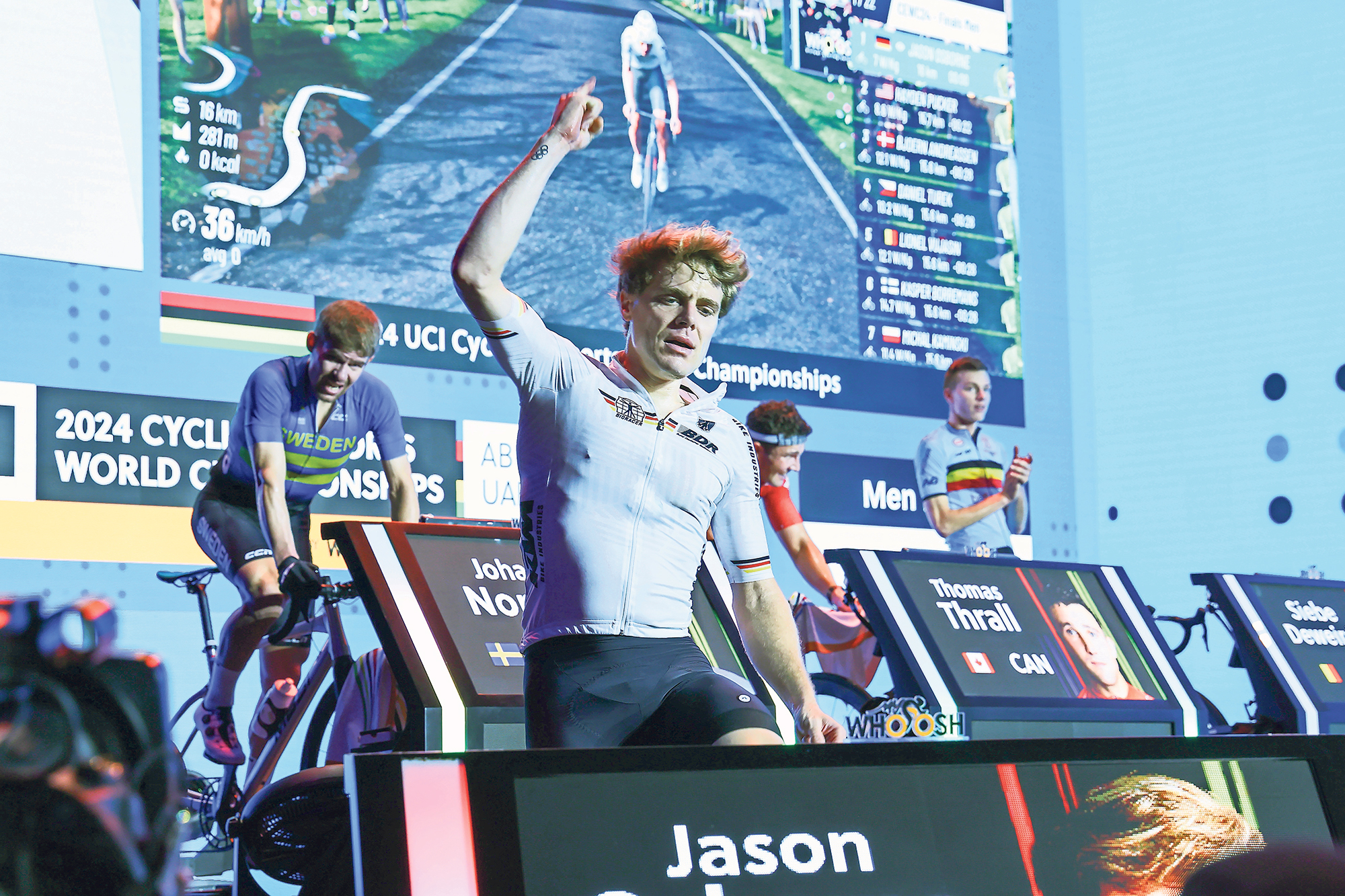In a bike shop in the global cycling hotspot of Girona recently, Jason Osborne overheard a typically sniffy conversation about “virtual” racing. “I would never do it,” said the voice on the other side of the store. Osborne, the reigning cycling e-sports world champion, happily ignored the jibe and continued on his way.
Like so many in Girona, the German has personal experience of professional cycling from two years competing on the World Tour with the Alpecin–Deceuninck team. In a prior sporting life, he spent the best part of a decade as a rower, culminating in an Olympic lightweight double sculls silver at Tokyo 2020.
But now 31, he is earning more than at any other time during his elite sports career, bringing in an annual six-figure sum. Best of all, he does not even have to leave his living room.
“A lot of people think: ‘What is this guy doing?’” says Osborne. “I choose to focus on e-sports now because the money is so good and it’s an easy lifestyle. The training is not easy, but you can travel wherever you want and just have to make sure there is a turbo trainer [a piece of equipment that allows a bike to be ridden stationary].
“I have a normal life without a team telling me what to do. I never liked working for other people, so it’s nice to be my own boss.”
Founded as an indoor training tool, virtual cycling – where people use stationary bikes to power digital avatars – was recognised as an official discipline by the sport’s governing body in 2018, leading to the advent of the inaugural Cycling Esports World Championships two years later.
Virtual cycling works by connecting an app via Bluetooth to the turbo trainer – the app connects to a monitor in front of the bike, which displays the race data and the digital avatars that an athlete races against.
It was victory at that event in 2020 that catapulted Osborne on to the radar of professional teams, earning him a dream Alpecin–Deceuninck contract. But he soon realised the reality did not match his vision.
“At the beginning it was really exciting,” he says. “I had high ambitions for myself. But the team would want me to go from race to race. There was really no structure or build-up to my races.
“Lots of people are just lost souls, in my opinion. It might sound selfish, but I want to see what potential I have and don’t want to work for others the whole time. There was never the satisfaction that I wanted to get out of it.”
Newsletters
Choose the newsletters you want to receive
View more
For information about how The Observer protects your data, read our Privacy Policy
Seeking control over his career, he embarked on a newly laid path as a full-time virtual cyclist.
This year, the minimum salary for most World Tour cyclists is €44,150 (£38,567), with first-year rookies receiving at least €35,721. By contrast, earning potential at the cycling e-sports summit is vast. While a number of virtual platforms exist – Zwift remains the largest – the advent of MyWhoosh’s Sunday Race Club has changed the landscape by staging weekly races that contribute to an overall monthly prize pot of $327,000.
Osborne and his main rival Michael Vink have slugged it out for top spot this year, bidding to earn in excess of £2,000 for an hour’s work. Add sponsorship, bonuses and boosted prize money, and the income ceiling for the best virtual riders is high.
Like Osborne, it was Vink’s e-sports performances that earned him a two-year World Tour contract with UAE Team Emirates, before he returned to full-time virtual riding this year. “People think I’m just getting by [financially], but it’s actually quite the opposite,” says the New Zealander, 33, who also lives in Girona.
“I’m doing better than I was on the World Tour, which surprises a lot of people. If you are really focused, dedicated and commit to it, and you can get consistent top results, it’s a good opportunity for full-time work.”
Despite the recent virtual cycling boom – and an increasingly common crossover between indoor and outdoor riders – Vink admits a snobbery still exists towards the e-sports world.
“Indoor cyclists tend to be tagged with a certain view that they are not very good at handling a bike and are not very good in the bunch,” he says.
“There’s still a certain stigma. Some of it is probably deserved. If you haven’t done all those years of racing outdoors you’re just never going to be as good on the bike outdoors. But it is changing. Everyone is being more open and accepting to these new pathways.”
Osborne, who was frequently dismissed as the “Zwift guy” at the start of his professional outdoor career, suggests a one-hour virtual race is “way harder than a road race, it’s just that road racing is much longer”.
Whatever the perception from their outdoor counterparts, Osborne and Vink have no regrets at leaving the mainstream to front a growing side of the sport. Next Friday, the pair will battle at the Cycling Esports World Championships semi-finals. While Osborne has never missed the podium in the event’s four-edition history, it is Vink’s first attempt to win a rainbow jersey.
So close are their Girona apartments that they will compete just a couple of kilometres apart. Osborne has raced at times this year from his parents’ house in Germany and, when travelling, from an Estonia hotel room. It is easy to see why more cyclists are taking a potentially lucrative virtual plunge.
Photograph by Ryan Sosna-Bowd/Getty Images



